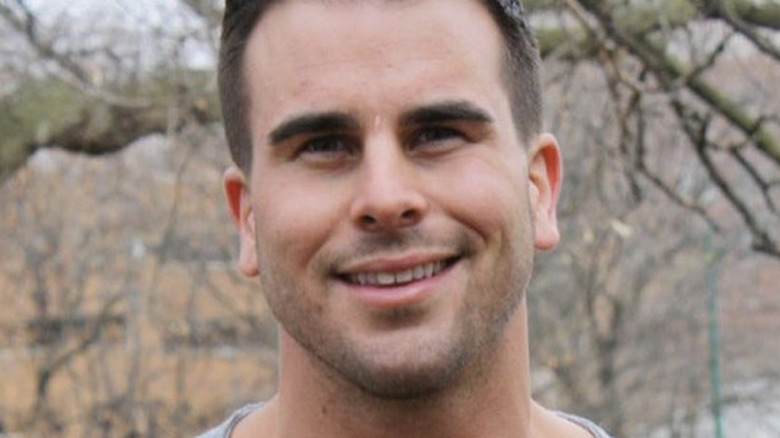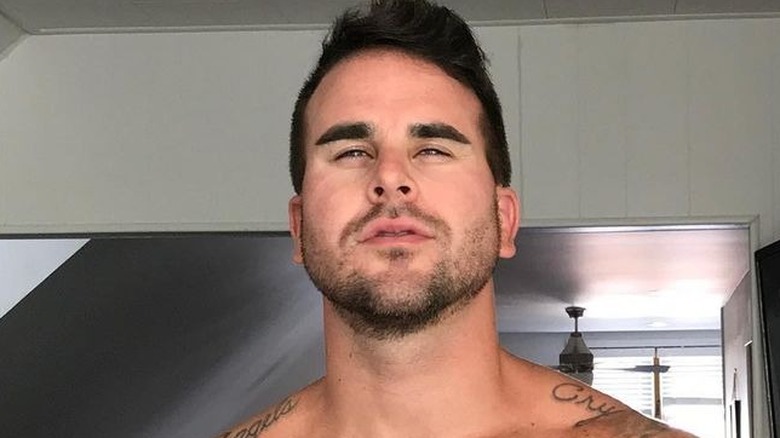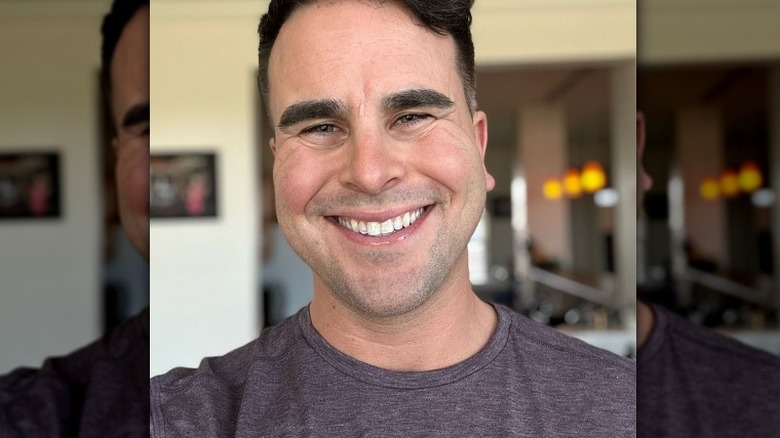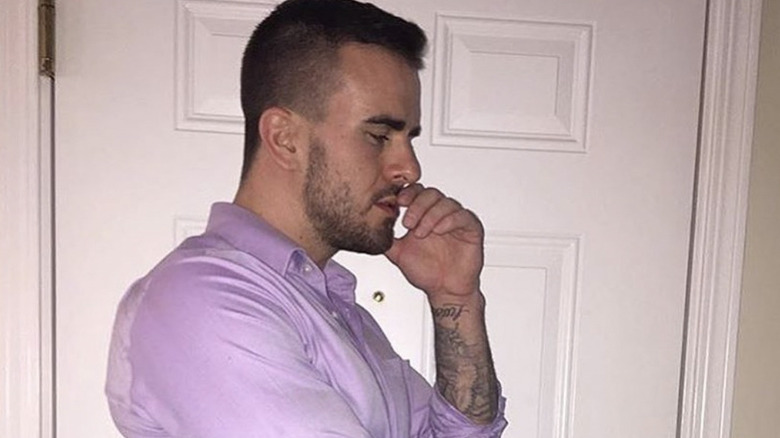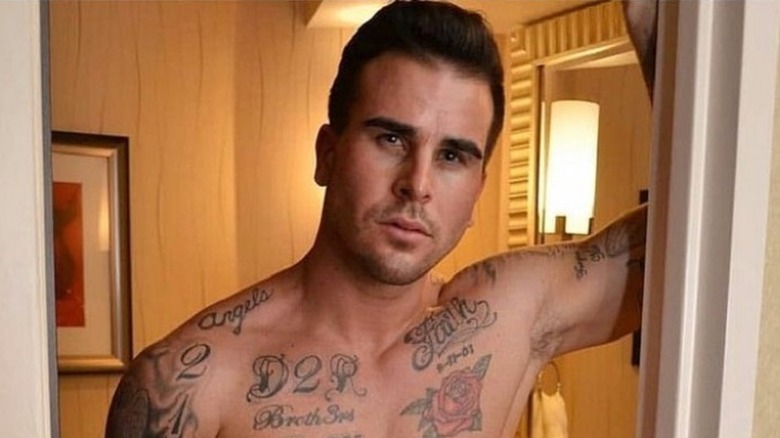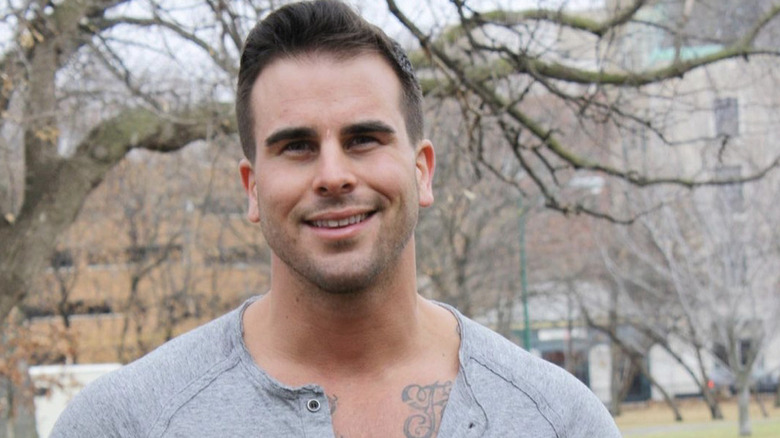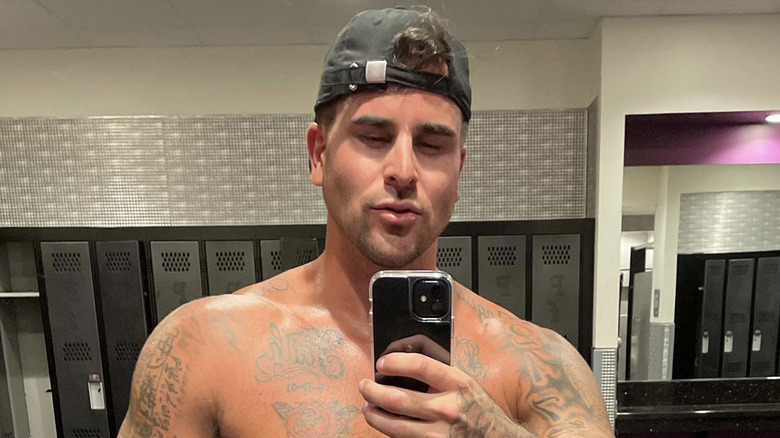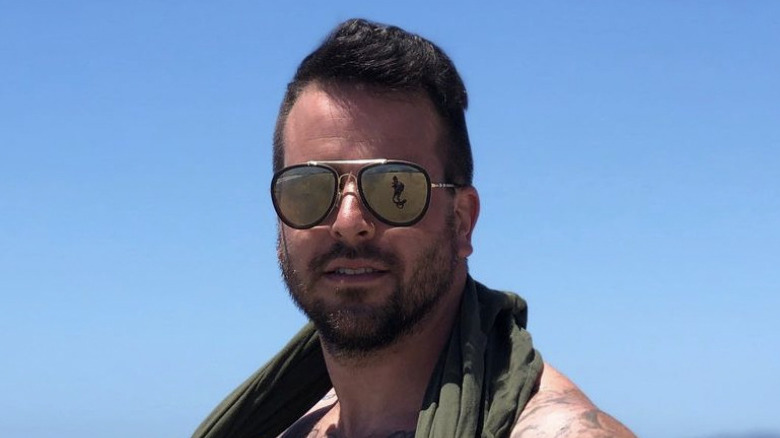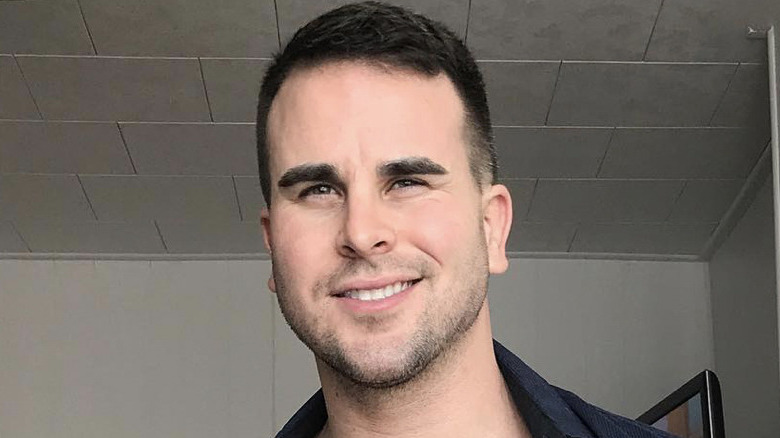Social Media Star Josh Seiter Dishes On Fitness, The Bachelorette, & The Importance Of Mental Health - Exclusive Interview
If anyone knows what it means to transform, it's Joshua Seiter. He may not be on everyone's radar, but we're here to tell you he should be. After making a small splash on the pop culture scene due to "The Bachelorette" franchise, Seiter began working tirelessly to build his own unique social media brand — just a couple years later, he's achieved such a goal, and now boasts more than 200,000 followers on Instagram alone. What does the heartthrob and gym goer post, you might ask? Probably not what you expect, and in an exclusive interview with Nicki Swift, Seiter revealed his motivations for posting about his weight gain, physical transformation, mental health struggles, and more.
Seiter may have conducted our interview while getting a quick workout in, but don't think he's a classic "gym bro." Seiter is a sweetheart — quick to thank us for the chance to open up and eager to share his story. After a career in dance and performance — and always being on an intense diet — Seiter found comfort in food freedom, and his body quickly changed as a result. After finding financial success and an expanded spotlight thanks to Instagram and OnlyFans, Seiter reflected on his career, transformation, and the work he's put it in to get to where he is. Here's what he had to tell us about his journey.
How Josh Seiter found freedom with food and physical health
First and foremost, I want to go all the way back to the early days of your weight gain, your body shift. Was there an instigating moment or experience that resulted in your lifestyle changing?
Yeah, I remember I was dieting extremely hard. I always had been because I was a exotic dancer and then also, obviously, do Instagram stuff. And through that, there's this emphasis on body and everything like that, and then you want to look a certain way, obviously, for dancing and Instagram. So that all played into what I think already was an addictive and obsessive personality that I'm predisposed to, which really took what could have been a healthy hobby, and it turned it into a toxic and unhealthy obsession. So I was constantly weighing myself, constantly looking at other Instagrammers and other dancers, and just being hyper critical of myself instead of just comparing myself to a rubric of what's healthy for Josh, not what does X person look like, but what's healthy for me?
So I got just completely sick of it when I quit dancing and I said, "You know what, I think now is a moment when I can embrace being me and my authentic self, and I think my followers will appreciate that more than if I just keep posting shirtless selfies of how fit I am." And sure enough, as soon as I made my first post about deciding to just be a healthy weight, not trying to fit into any kind of subjective standard, everyone responded positively to it. So that just confirmed what I already knew in my head, and then that's when I was like, "All right, I'm totally in with this." And then my OnlyFans started taking off with people that were into gaining and all that stuff, so it served a dual purpose of not only inspiring and helping my followers, but then it also made me money on my OnlyFans.
Yeah, I was going to say. And that's interesting that you had that pendulum swing from being so obsessed. I used to be in the dance industry as well, so I really get where you're coming from. Talk about the element of recovery that was in there, both physically and mentally, I'm assuming.
I just remember specifically, there's this seminal moment where it was breakfast and for the last six years, I had been staying fit. I would just ... be hungry. They had three blueberry pancakes, a cinnamon roll, a pop, bacon, eggs, and I hadn't had bacon in five years. And just eating what to some is their everyday meal, for me, felt amazing. And so, after that, I was hooked, and I probably took it a little too far and might have gained so much weight that it then became unhealthy, just like losing too much weight or being too fit can be unhealthy. But that first month or so made me feel like I could finally not be tortured by food, like I could love food, have a good relationship with food, not hate food or hate myself for eating food.
And so, that went a long ways, I think, in helping me not be so anxious and depressed, because looking back, again, being someone who has anxiety, depression, and OCD, I think the constant dieting definitely played into my stress and exacerbated it and made it worse, so I definitely felt like it alleviated all those symptoms and I just felt happier. There was definitely a degree of confidence that might have been lost, and I wasn't walking around looking like Superman with eight pack abs. But the benefit that I got from just being able to eat a big breakfast and not feel guilty about it and hate myself felt really good, so I would say that, definitely, it improved my mental health because I didn't have to be anxious about eating.
If you are struggling with an eating disorder, or know someone who is, help is available. Visit the National Eating Disorders Association website or contact NEDA's Live Helpline at 1-800-931-2237. You can also receive 24/7 Crisis Support via text (send NEDA to 741-741).
Eliminating the stigma surrounding men and mental health struggles
I think there's a really interesting level of bravery on your part for sharing that, I think especially because what you're describing, mental health, disordered eating, aren't really topics that we see men discussing very often. Have you gotten a chance to talk to followers about that? What's that been like for you?
Yeah, it's been a very positive response that I've gotten ... actually. A lot of women saying, "Hey, as a man, it's inspiring to see that you're talking openly about this because of the stigma of men needing to fit masculine stereotypes." A lot of them say, "I have a boyfriend that also deals with body dysmorphia or depression and anxiety or a combination thereof. Thank you for your posts. It's helpful. It's good to see a man that can discuss these things." So I think that the response overall has been great, but I'm not going to lie, I did get a lot of hate mail, a lot of people saying, "What the hell happened to you," direct messages on my Instagram, "You used to look so hot. Now you're fat. Why did you destroy your body? You're ugly now. You need to lose weight." So it's like a double-edged sword and it definitely cut both ways, but I felt more, the benefit from the positive comments outweighed the negative from the negative comments.
Well, and like you said earlier, I think we have, as a society such a warped understanding of what health looks like, and dancers is a great environment and category to talk about. And I can speak from my own experience, we look healthy, when in actuality, the things that we have to do to get our bodies to look like that and then sustain that are really unhealthy. So it's a really quasi, backwards way of approaching body image and health, just overall.
I used to actually respond with that. They'd say, "You used to look so healthy." I said, "Dude, I was starving myself and eating an apple and drinking a coffee to look healthy with ripped abs," so I mean, you summed it up perfectly. I can't state it any better.
So in the journey that you've been on, you found this food freedom, gained weight, and then what made you want to get back into the gym? What's your body transformation been like in this process?
Yeah, so that's a great question. In and of itself, working out and eating healthy is not bad if you're doing it because you love it and you're doing it for yourself and you're doing it in a healthy medium and not going to the extreme. However, the way I had been doing it was for other people because I felt compelled to, because of my job, and I was taking it to the extreme. So I'd say after a few months of being heavy, I realized there's some downside to this. I sweat a lot more, it's a struggle going for long walks, none of my clothes fit anymore. So I said, "What is a way I can be healthy, reach that happy medium where I don't have to be super skinny, but I also don't need to be really overweight, and what's a way I can achieve that?" And I said, "Well, if you work out for yourselves and you're not doing it for others and you do everything in ..." What's the word I'm looking for? In-
Moderation.
Yeah, in moderation, then that's fine. And so, I started doing that, and I've actually stuck with it, and I would say that is what hit me, was, as long as I'm doing it in moderation, it's fine, and the same goes with eating. Sometimes I'll eat a pizza, but I do it in moderation and I don't eat two pizzas like I was doing before. So I'd say it was, overall, just a desire to reach a happy medium and something in between, and I feel like I've found that now.
If you or someone you know is struggling with mental health, please contact the Crisis Text Line by texting HOME to 741741, call the National Alliance on Mental Illness helpline at 1-800-950-NAMI (6264), or visit the National Institute of Mental Health website.
This is why Josh Seiter has been so open on social media
We've touched on it a little bit, but you've been extremely candid on social media about your body image, your mental health. What has really motivated you to share such personal experiences, because those aren't easy to expose to other people.
So it was, again, just this moment where I was like, "Should I just go for it?" So I was like, "I think that, just like with the weight gain, it makes me uncomfortable, but I think my followers will respond positively if I just embrace this." And so, I had that exact same approach and mentality with the mental health stuff. I didn't want to talk about dealing with suicidal ideations and depression and anxiety, but I said, "You know what, I think if I put my ego aside, a lot of people can benefit if I'm just transparent and open about this." And again, I did it, and again, it was a great, positive, overwhelming response and support. And so, that just solidified it for me, that yes, that was the right thing to do, and so after that moment, it was easy to just keep posting about it and interacting with my followers who were responding.
Definitely. Well, and social media can be such a curated image of ourselves that we put out to other people, and I feel like we are on the precipice of this wave of authenticity on social media, but it's still a very ... You never know what's photoshopped, you never know what's real, what's not, so I think that a lot of people, especially given the pandemic changing bodies, changing mental health and attitude towards it, that people are just craving authenticity and connectivity, and it's great that you're doing this.
Yeah, and that's another reason I hate to like, and I've made multiple posts about this that are on my page, about everything on social media's perfect abs and perfect proportions. I like to be contrarian and go against the grain, and so I was like, "I want to do the exact opposite, so whatever is in vogue now, I want to go completely against it." And that also motivated me to be like, "I'm going to talk about suicide, I'm going to talk about gaining 80 pounds, I'm going to talk about eating whatever we want and not always having six pack abs." And so, it was also this iconoclastic desire to go against the grain that made me want to speak out. It pissed me off that everything I saw was guys flexing in [tank tops] with abs. I was just like, "This is stupid. I've been looking at this for eight years that I've been on Instagram. I'm tired of it. It's time that someone posts something else."
Being an inspiration to others
Yeah. Well, and with women, we talk a lot about body image, and there's so much content out there discussing body image. But with men, it is as prevalent of an issue and it's not really talked about nearly as much. And you've got the six-pack abs, you've got the gym bros, and 85, what, 90% of men don't look like that, and there's such power in diversity and variety. And I think if we can shine any kind of authentic light on just being different, it's going to reach people, and that's going to be a powerful thing. Even if it reaches one person, it's a powerful thing.
Exactly. And I had to be honest, does Instagram really need another guy with tattoos that has his shirt off? No. Could Instagram use someone that's talking about these serious issues that actually impact a lot of people's lives? Yeah. So it was an easy decision for me, so yeah.
Is there maybe one or two inspirational messages from followers that have really stuck out to you in this process?
Yeah, there's three or four people that I can think of right off the bat that said that, it was women, actually, that said that their husband, or one was her son, struggled with the same things I did, bipolar, depression, and anxiety, and that my page ... They showed them my page and it seems to be helping them and they're seeing a therapist now, and so-
Oh, awesome.
Yeah, getting messages that you see that people are taking concrete steps because of a post that you made situates it and let you see that there's literally real world consequences too and benefits of posting about stuff on social media. And so, that was inspiring to see, wow, this guy in West Virginia is now going to see a therapist for the first time in his life because I made a post in Chicago in my bedroom about depression. The power of social media really came out then.
If you or someone you know is struggling with mental health, please contact the Crisis Text Line by texting HOME to 741741, call the National Alliance on Mental Illness helpline at 1-800-950-NAMI (6264), or visit the National Institute of Mental Health website.
He shares the 'catalyst' responsible for his pandemic experience
I wanted to talk to you a little bit as well about all of this coexisting with the pandemic, this very isolating time, obviously, us trying to connect with others became a real challenge, so what was it like, having these two things congruently happening?
Yeah. I would say that was the catalyst. The lockdowns were the catalyst, I think, for me, to overcome a fear of judgment and stuff that I had had before. It was like, I was so isolated and so bored and so lonely from the lockdowns, and I was like, "You know what, I'm just going to do this," and it actually helped to bridge that isolation and help me connect to other people. And so, I think without the lockdowns, it may have never happened. I don't think I would've ever been so hyper-focused on talking about mental health and stuff because I would've been out, doing things in the real world. So I think it definitely accelerated it and brought it about.
And so, for that reason, it was good, but I think the lockdowns have taken a serious toll on people's mental health ... I, myself, am not a huge supporter of draconian lockdowns. I don't think that the benefit outweighs the costs of them, but it is what it is, and we have to make the best of the situation, and so I think that helped it. The more stringent the lockdowns became, the more that accelerated people's interactions on social media, so if anything personifies a silver lining, that would be the silver lining, yeah.
Well, and I think with lockdown as well, I think it forced a lot of people to slow down and spend time with themselves, which is a scary thing to do, especially in a society where we can keep working, and go to the gym, and meet up with friends, and go out for dinner, and then go home and keep working, when all of a sudden, those things are no longer an option, where we were forced to sit with ourselves and say, "Oh, who am I outside of my 70-hour work week? Who am I outside of my social circles?" And that introspective work is difficult.
Yeah, I think you bring out a really good point. I think it's like the circuses and cake thing from the Roman times, is we can entertain the populous with these vacuous things like football games, and all these "American Idol" contests, and things that are meaningless, and then they won't question the structures and hierarchies that are in place, that mitigate against their interests. And so, I think a lot of the existential thinking and critical thinking about politics and policies and people being who they really are all came about because, like you said, we weren't as entertained with stupid drivel and we were allowed to actually think critically about systems that were in place and we were able to question them. And so, I think that that was, again, another silver lining that came out of that cloud of the lockdowns.
Josh Seiter dishes about his OnlyFans experience
I want to talk to you a little bit about your experience with OnlyFans. We've talked about Instagram. So tell me what your experience on that platform has been like and what the difference is in your social media.
Yeah, so obviously, Fans is ... definitely different. So I don't do fully nude or anything. I just post eating pics. When I was gaining weight, I did a ton of underwear pics because like I have a huge a** and that's what I'm known for on my Instagram, so I'd post underwear pics on there and stuff. But I don't do full nude, and what's interesting about it is, I, for a long time, have been in the top 1% of earners on OnlyFans. At one point, I was in the top 0.01%. That was back in 2018. Oh. Financially, it's been great. I'm now in the top 9.5%. I've fallen out of the top 1%, actually, as soon as I stopped gaining weight, and as soon as I got back fit, I instantly dropped out of the ... I went from top 10% months ago and then when I gained weight, I shot up, over a period of six weeks, into the top 0.07%, and now I'm back down in the top ...
That's interesting.
... 9.5%. Yeah. There's definitely a bias towards gaining and stuff like that. But Fans has been great to me financially. I've invested almost all of the money I've made on it. I'm really into investing and stuff like that. I can take this off. Yeah, I'm done. And so, it's been great, but it's a double-edged sword because people on there only care about your body. So to answer your question, the way it contrasts with Instagram is, on Instagram, I get genuine engagement about substantive issues, and when I'm on Fans, it is literally, you are nothing but an a** in underwear and a gut hanging over your underwear. "I don't care about anything other than seeing you naked. How much money can I pay to see it?" And then I shamelessly play into it and make a bunch of money off of these people by giving them what they want, with certain limits. So it's definitely a degrading experience, if I had to roughly sum it up, compared to the rewarding experience of Instagram, but it puts money in your pockets and lets me live, so I'm not going to complain about it.
Yeah. It's so interesting to me. I feel like OnlyFans has ... We've just seen it skyrocket, even within the last year, and it's a really fascinating reflection of society, I feel like. I don't know exactly how to describe it, but it's fascinating to talk to someone who has had that experience on it because I feel like it's such a reflection of the times.
It exposes the dark underside of people, and it shows you that sex will always sell, and it shows you the worst side of people, and I would say it caters to the lowest common denominator, so I'm not getting deep thinkers on there. I'm literally getting people that are used to seeing something they like and then have a knee-jerk reaction to just click or to spend money. And so, it definitely caters to the lowest common denominator, but those are the ones that pay my bills. People talking to me about mental health on Instagram is nice, but it doesn't pay my bills, so it can only go so far.
What does Josh think of The Bachelor franchise today?
Briefly, because I'll keep you for no more than half an hour, I want to talk to you a little bit about your time on "The Bachelorette," just briefly, and what it did for your public life, and what you took away from your time on the show, and what lessons you learned from that experience and how it's helped you, moving forward.
Yeah, so "Bachelorette" is interesting. I went on the show, and I was only on two episodes. I would say, thankfully, in hindsight, I'm thankful that I stripped out of the limo and did that because it was the only memorable scene with me in it, because I was booted off the show so quickly. So I was definitely disappointed with how short my time was on that because it is the most watched reality show in the world. I think at the time, there was 25 million viewers every episode, and so for me, as a exotic dancer in Chicago, having the platform of being on "The Bachelorette" had the potential to change my entire life. But I came off the show with only 600 more Instagram followers, So at the time, I had 5,000 Instagram followers and I got up to 5,500.
With that said, it was a blessing because that lit a fire underneath me, and I felt so shafted by the show that they booted me so soon because I felt like I had so much to offer, that I said, "I am going to become big on Instagram with or without 'The Bachelorette.' This is not the end of me. They're not dictating my story." And so, that literally lit a fire under me. From 2015, when that show aired, to 2018, I literally slaved on Instagram every single day with just posting content and mental health stuff and shirtless photos and anything.
And it actually worked, and I experienced organic growth from that, up to over 200,000 followers, without the help of "The Bachelorette." So a lot of people now are like, "Oh, you're verified on Instagram and you have 200 and some thousand followers. That's because of 'The Bachelorette.'" And I'm like, "No, it's not. I literally got all of that by working hard after the show and talking about stuff that resonated with people," and so I'm thankful for "The Bachelorette," but it contributed very little to what I would say is my success now on both Instagram and OnlyFans. That was self-created.
The social media star talks about The Bachelorette's authenticity
You're talking, as well, about issues that we haven't really seen "The Bachelor" or "Bachelorette" really include, so it seems like it's worked in your favor.
Yeah, they talk about a very narrow range of issues, and I realized, I don't really fit that narrative that's on there about love and family and everything they talk about. I realized after the show, when I got booted, "You know what, Josh, you don't want that to be your story. Do you want to be remembered as one of 25 men on one of 20 seasons of 'The Bachelorette' or do you want to be remembered as Josh Seiter, the OnlyFans star that talks about real sh*t on Instagram?"
And so, looking back with hindsight, I'm actually grateful I got booted so soon and that my success came from organic growth on Instagram and not from that show, because I promise, if I had gotten big on that show, it would've faded by the time the next season came on. But because I created the groundwork and the roots for something much bigger than one season of television, that's why it has had the longevity it has had, and I've been in the top one to 10% of OnlyFans since 2018 because I joined in the very beginning, and why I think my engagement on Instagram is still so high today, so it was actually a blessing.
I assume your answer to this question. I'm assuming you don't watch the show anymore?
I do not. I saw an episode of "The Bachelorette" or "Bachelor" a week ago, but other than that, I have never watched it.
Yeah. Do you think it's an authentic representation of love?
So I have to watch what I say because I don't want to get sued, but I mean, I think that with my experience on the show, it was not authentic. And I think that if you look at most of the couples, they post very cheesy, corny, what sounds like scripted posts on Instagram after the show, and then about six months later, almost all of the couples are broken up. There are some exceptions, but it seems to follow a boilerplate progression. And to me, it comes off as fake, and that's a reason I don't even watch. Someone asked me last week, "You don't watch 'The Bachelorette?'" And I go, "Dude, how can anyone relate to this?" I was like, "They're in love after two dates? It's stupid." I think it's becoming less and less popular as people move towards ... As you said, there's this movement towards authenticity. I think that shows like "The Bachelorette" are becoming less and less popular because people want to see things that feel real, and it just doesn't feel real.

